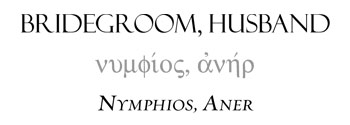Praying the Names of God - April 21
From Praying the Names of Jesus Week Nineteen, Day One
The Name
God is not content to be known merely as Creator, Lord, or even Father. Incredibly he reveals himself also as Bridegroom or Husband. The Hebrew Scriptures contain numerous allusions to Yahweh as Israel's divine Husband, and the New Testament presents Christ as the church's Bridegroom. He is the Holy One who did not cling to his divinity but left his Father's house to dwell among us, calling us to become one with him in the most intimate way possible. To all of us, male and female, Christ offers himself as our provider and protector, the one who has forever pledged himself in faithfulness and love.
Key Scripture
Blessed are those who are invited to the wedding supper of the Lamb! Revelation 19:9
***
Monday
His Name Revealed
"For your Maker is your husband —
the Lord Almighty is his name —
the Holy One of Israel is your Redeemer;
he is called the God of all the earth.
The Lord will call you back
as if you were a wife deserted and distressed in spirit —
a wife who married young,
only to be rejected," says your God.
"For a brief moment I abandoned you,
but with deep compassion I will bring you back."
Isaiah 54:5-7
Then I heard what sounded like a great multitude, like the roar of rushing waters and like loud peals of thunder, shouting:
"Hallelujah!
For our Lord God Almighty reigns.
Let us rejoice and be glad
and give him glory!
For the wedding of the Lamb has come,
and his bride has made herself ready.
Fine linen, bright and clean,
was given her to wear."
(Fine linen stands for the righteous acts of the saints.)
Then the angel said to me, "Write: ‘Blessed are those who are invited to the wedding supper of the Lamb!' " And he added, "These are the true words of God." Revelation 19:6-9
Lord, you left your Father's house to come to earth and claim me as your own. Thank you for showing me what love is by the way you lived your life. Preserve me from both worldliness and weariness as I await your coming. I pray that on that great and terrible day, I, along with all your people, will be ready, eagerly awaiting your return as our Savior and our Bridegroom.
Understanding the Name
Marriage in Israel was generally considered sacred, the only acceptable state of life for men and women. Despite polygynous practices, whereby a man could marry more than one wife, monogamy was the accepted pattern throughout most of biblical history, especially after the patriarchal period.
Most marriages were arranged by parents. The minimum age for girls was twelve and for boys was thirteen. The period of engagement or betrothal usually lasted a year and was considered so binding that a man who had intimate relations with a virgin betrothed to another man would be stoned. For the year following the marriage, the husband was exempt from military service.
This practice prevented the bride from becoming a widow in her first year of marriage and it also allowed the man to devote himself more fully to his wife at the start of their marriage.
Though the marriage ceremony itself was brief, the celebration surrounding it could be elaborate, consisting of seven and sometimes fourteen days of feasting and celebrating. During the festivities, dating from the time of Solomon, both bride and groom were crowned as king and queen and their virtues were extolled in song and poetry.
The Hebrew Scriptures did not hesitate to describe the relationship between God and his people in the most intimate of terms: Yahweh was husband and Israel was his not-so-faithful wife. By referring to himself as the bridegroom, Jesus was clearly linking himself with Yahweh. New Testament writers presented the church as the bride of Christ. Nymphios (num-FEE-os) is the Greek word for "bridegroom" or "young husband" while aner (an-AIR) can be translated "man" or "husband."
When the disciples of John the Baptist asked Jesus why his disciples did not fast, Jesus replied that it was not possible for the guests of the bridegroom to mourn as long as he was with them (Matthew 9:14-15).
John the Baptist used similar imagery when he referred to himself as the "friend who attends the bridegroom" or the best man (John 3:29).
Studying the Name
- What does the passage from Isaiah reveal about God's character?
- What does it reveal about the nature of his relationship with his chosen people?
- How does the passage from Revelation compare and contrast with the passage from Isaiah?
- What do you think it means that Jesus is the Bridegroom?
For more from Ann Spangler, please visit her blogspot on Christianity.com. And be sure to check out Ann's newest books on AnnSpangler.com. To hear more from Ann Spangler, sign up today at annspangler.substack.com.
Meet your spiritual ancestors as they really were: Less Than Perfect: Broken Men and Women of the Bible and What We Can Learn from Them.







